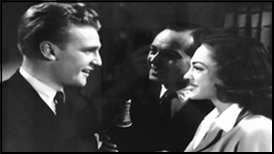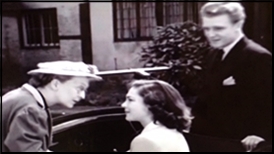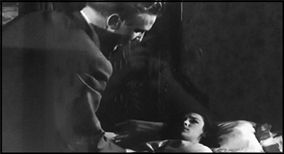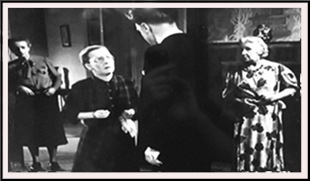Mon 22 Mar 2021
A Mystery Movie Review by David Friend: CROW HOLLOW (1952).
Posted by Steve under Mystery movies , Reviews[7] Comments

CROW HOLLOW. Eros Films, UK, 1952. Donald Houston, Natasha Parry, Pat Owens, Melissa Stribling, Esma Cannon, Nora Nicholson, Susan Richmond. Based on the novel by Dorothy Eden. Directed by Michael McCarthy. Currently available online here.
Gothic thrillers usually see a young woman marry a man and move to a spooky old house where she begins to fear he may kill her. Many novels – from Mary Roberts Rinehart to Mary Higgins Clark – revolve around such portents, and Hitchcock made use of it too in Suspicion. It seems to happen also in this 1952 film in which newlyweds Ann and her doctor husband Robert move onto his family estate. However, the twist is that the danger does not stem from the new husband but, it seems, from the three eccentric old aunts who live with them.

There’s Aunt Judith, a bespectacled entomologist; the doting Aunt Opal and the tall and severe Aunt Hester. All the aunts seem to adore their nephew and they are friendly enough to Ann, but she senses something is wrong. Robert’s dying mother had anxiously warned her not to go to Crow Hollow and she feels lonely and listless there while Robert is at his surgery in the village.
The crows have returned to roost for the first time in decades, and legend has it that they foretell tragedy. Ann is also puzzled by the way in which her husband’s aunts indulge their insolent maid, Willow, and even catches the girl trying on her clothes. Things get stranger still when Ann suffers a series of accidents…

This is one of the best B-movies I’ve seen yet. It may be rather languid – particularly for the first few minutes – but it’s one of those films in which the atmosphere takes precedent over plot. The aunts are suitably creepy, despite being polite, and we appreciate Ann’s trepidation as she is left alone with them. Played by actress Natasha Parry – whose career would be defined by her marriage to film director Peter Brook and the parts he gave her – Ann is a likeable, generous woman who is already in an unsettling situation before the danger starts.
It does so about twenty five minutes in, and it is Parry’s engaging performance which holds the film until then. Husband Robert is a bit of a wet blanket who frustratingly – but, by the conventions of the genre, inevitably – dismisses his wife’s concerns. The film is only marred by its rushed ending and I was able to conjure a couple of better scenarios myself as, I think, would many others. Nevertheless, it’s well worth an hour and ten minutes of your time and – like so many excellent old films – is available for viewing online.
Rating: ***

March 22nd, 2021 at 9:01 pm
Agreed 100% on this one, a surprisingly effective gothic thriller, well acted, well staged, handsomely photographed, and save for a slightly weak ending intelligently scripted.
I haven’t read this particular Dorothy Eden novel, but from the ones I have intelligence and atmosphere as well as character and quiet terror are to be counted on in her work.
This one is well worth catching.
March 23rd, 2021 at 5:57 pm
I’ve not seen the movie, nor have I ever read anything by Dorothy Eden, but FWIW from a bookseller’s prospective: Back in the 1980s and early 90s, when I did specialized mailorder lists of Gothic paperbacks, the author whose books would sell the quickest — always — was Dorothy Eden. She was very popular.
March 22nd, 2021 at 10:59 pm
Three years earlier, Donald Houston was lading man to Jean Simmons in the original Blue Lagoon. After that, I followed him and was disappointed that he did not evolve into a top-leading man. Crow Hollow was one of the earliest films on American television. By early, I mean relatively soon after production. I saw it on the Early Show (CBS) in New York. There was, of course, a LateShow on the same station and they had a big supply of MGM pictures. I stayed up late.
March 23rd, 2021 at 12:38 pm
Did Mary Roberts Rinehart ever write a book about a woman slowly fearing her husband wants to kill her? Not that I can recall.
In THE CASE OF JENNIE BRICE the husband is a suspect.
March 23rd, 2021 at 8:41 pm
Eden went on to gain respect far out of the gothic field. I recall in college quoting from her novel on Parnell in a history paper and being complimented for my excellent taste in historical fiction.
March 24th, 2021 at 10:09 am
I really should have mentioned it was based on a novel. Can’t believe I missed that. And I was wrong to make the Rinehart comparison too.
March 24th, 2021 at 5:41 pm
David,
Thank you for telling us about “Crow Hollow”.
It’s a film I never heard of before.
Looking forward to watching it!